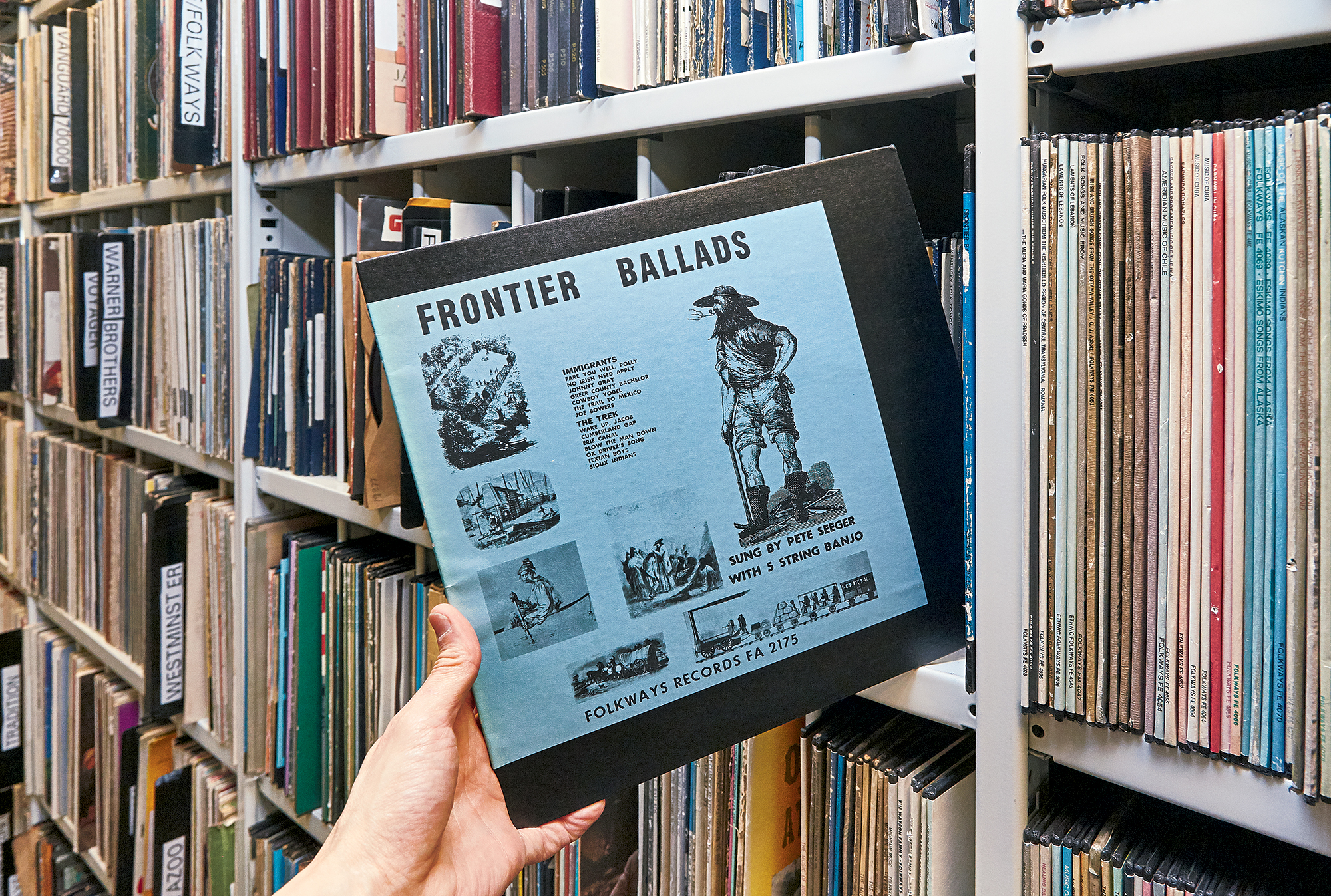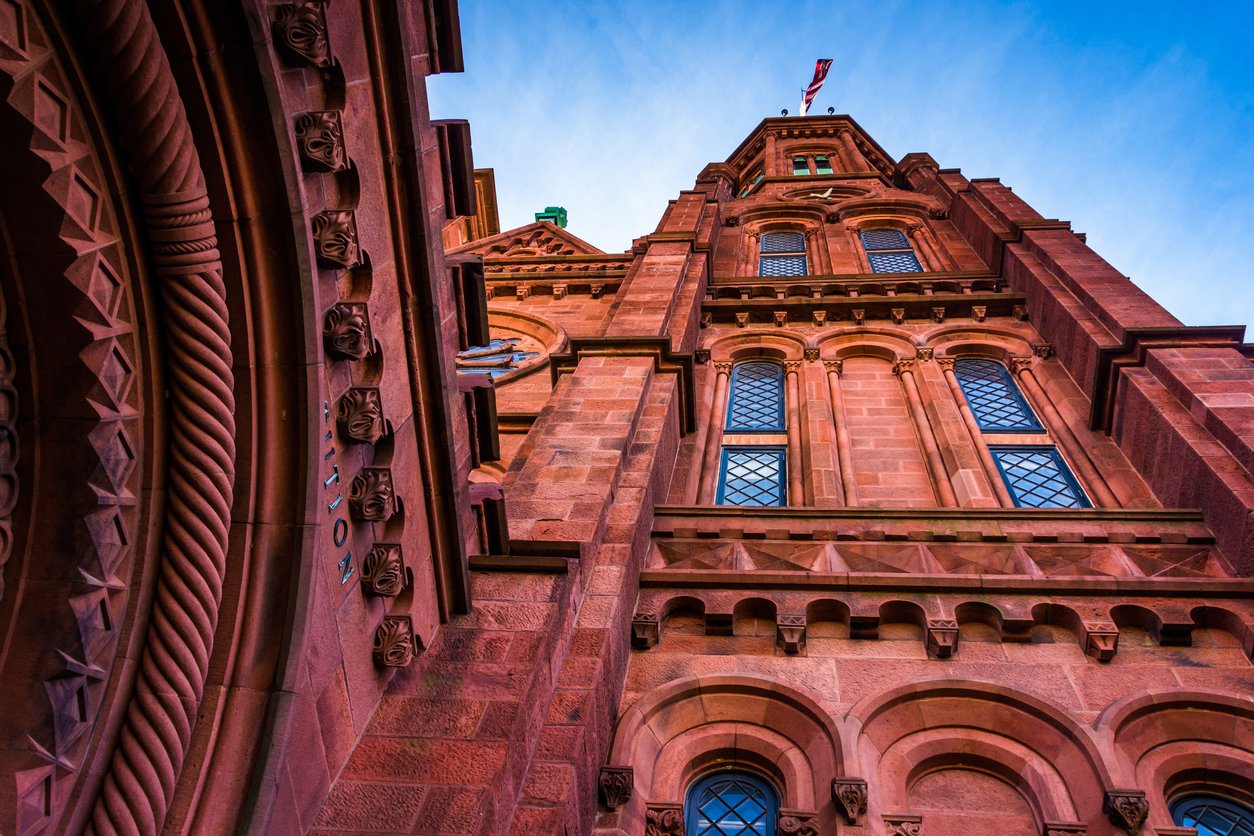Washington’s most impressive record collection sits on the second floor of a blocky office building on Maryland Avenue near the Mall. Lined floor to ceiling with more than 13,000 old albums, the Smithsonian Folkways archive is a record fiend’s dream—an invaluable trove of fascinating sounds from around the country and the world.
Though this collection is part of the Smithsonian Institution, it’s not a museum. Rather, it’s a working record company, albeit one whose offices could quite easily lure tourists away from the actual museums a few blocks away. (It’s open to the public by appointment.)
On a recent Tuesday morning, Folkways’ director and curator, Huib Schippers, and staff archivist, Jeff Place, wandered through the brightly lit space, showing off some of its treasures: an original pressing of crucial sessions by saxophonist Coleman Hawkins, an album of work songs once owned by Woody Guthrie, and oddball offerings with titles such as Speech After the Removal of the Larynx.
The collection also contains approximately 52,000 original recordings on reel-to-reel tapes and other media, as well as neatly filed boxes full of album artwork and correspondence. Place cracked open a container to share one such item, a 1945 letter handwritten by blues legend Lead Belly.
Folkways was founded as a private company in New York three years after that letter was written. The brainchild of folk-music obsessive Moses Asch, it specialized in all manner of traditional music—field recordings of aboriginal tribes in Australia, folk songs from Hungary, ambient sounds of steam locomotives, and other material that postwar audiences were unlikely to encounter on American Bandstand. In 1952, Asch released a transformational six-LP box set—curated by a collector named Harry Smith and titled The Anthology of American Folk Music—that was a pivotal inspiration for the folk revival of the 1950s and ’60s.
Folkways was acquired by the Smithsonian in 1987 and relocated to DC. Anyone concerned that a federal paycheck might diminish the label’s reputation for adventurous programming and solid scholarship would be mistaken: Still considered one of the country’s premier traditional- and world-music labels, Folkways turns 70 in 2018—and it’s undergoing something of a revival under Schippers, who is emphasizing new signings along with the label’s vintage offerings.
This year will bring albums from a slate of current artists, including bigger names (Laurie Anderson, Rhiannon Giddens) and lesser-known talents (folk duo Anna & Elizabeth, Iraqi oud player Rahim Alhaj). Perhaps most notably, Folkways is releasing the Smithsonian Anthology of Rap and Hip-Hop later this year, which promises to bring wider attention and new audiences.
“The value in Folkways is that it constantly challenges the mind,” Schippers says. “This is not ‘Hey, just listen and enjoy.’ It’s ‘Let’s try and understand where these things came from.’ ”
Since he came aboard in the summer of 2016, Schippers has been working to lead Folkways into the future. A native of Holland who lived for 13 years in Australia, the onetime music critic had already built several institutions before moving to DC. In Amsterdam, he founded an Indian-music school and got the Dutch government to fund it. He persuaded a conservatory in Rotterdam to branch out into world music, raising $20 million in the process, and later founded a research center at the Queensland Conservatorium in Brisbane. Schippers is also a “second-rate sitar player,” he says,despite having devoted more than 40 years to the instrument. “It’s fiendishly difficult music.”
At Folkways, Schippers hopes to update the label’s business strategy. Online streaming, which has become the primary way people consume music, brings in a fraction of what digital sales did only a few years ago. Schippers is now trying to find new sources of revenue, such as a high-end vinyl reissue series and a membership program offering downloads and other perks.
Because of the Smithsonian’s unique agreement with Asch, every release from throughout the label’s history must remain in print and available to purchase—an obligation that’s fulfilled in most cases via a pair of automated robots that press CDs on demand. Unlike most labels, which survive off of the occasional breakthrough hit, Folkways has generally been more of a long-tail operation, selling one or two copies a year of thousands of titles.
But while Folkways remains a crucial source of old music, Schippers is excited for the opportunity to record new albums with his label’s expanding roster of contemporary musicians. “We have to realize that Woody Guthrie was in Moe’s office all the time,” he says. “These people were not historical or archival. They were living artists.”
Schippers’s next big project is by far his most ambitious, and it could also be the label’s highest-profile release since it reissued The Anthology of American Folk Music more than 20 years ago. The similarly named Anthology of Hip-Hop and Rap—created with the National Museum of African American History & Culture—will feature more than 120 tracks.
Much of the material dates from before the genre went mainstream, making it a challenge to put together. “We spent 18 months negotiating rights,” Schippers says. “Hip-hop started in this anarchic, lawless environment, and now, with the amounts of money going around, it’s riddled with lawyers.” To help pay some of those costs, Folkways turned to Kickstarter. Fans quickly blew past the $250,000 goal, and the project is now on track for a late-2018 release.
How does hip-hop fit with Folkways’ larger mission? “We are a label that cares about people, that inspires people to engage intellectually,” says Schippers. “Moe Asch did a fantastic job making unheard or underrepresented voices be heard. That’s something that I want to continue.”
This article appears in the March 2018 issue of Washingtonian.


















